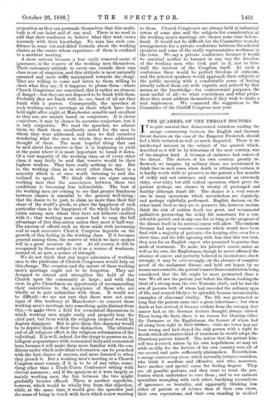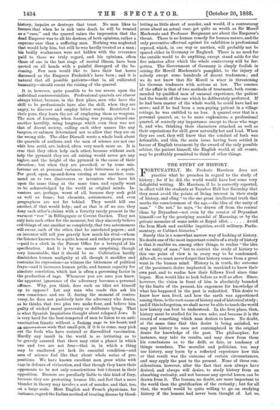THE QUARREL OF THE THROAT DOCTORS.
IT is quite natural that disinterested outsiders reading the savage controversy between the English and German throat doctors on the case of the Emperor Frederick, should feel a little irritated as well as much disgusted. There is no intellectual interest in the subject of the quarrel, which, described as it will be by historians of the next century, was of the simplest kind. A German of eminence had cancer of the throat. The doctors of his own country, greatly in- fluenced, we imagine, by military ideas, are accustomed to think that in such cases, when death is ultimately certain, it is hardly worth while to preserve to the patient a few months of sickly and sad existence, and recommend an extremely risky, over-risky, but still radical operation, which gives the patient perhaps one chance in twenty of prolonged and healthy although dumb life. The chance is a very remote one in many operations which nevertheless are regularly, and perhaps rightfully, performed. English doctors, on the other hand, bred as they are to preserve life, however useless, think the risk of sudden death too great, and recommend palliatives protracting the sickly life sometimes for a con- siderable period, and in any case for as long as the progress of the disease itself in its natural course will allow. The eminent German had many reasons—reasons which would have been final with a majority of patients—for keeping alive even for a short time, and his wife agreeing with him that this was best, they sent for an English expert who promised to pursue that mode of treatment. To make his patient's course easier, as well as his own, the Englishman, though he never affirmed the absence of cancer, and probably believed in its existence, dwelt strongly, it may be over-strongly, on the absence of complete proof of the malignant disease, and held out hopes, by no means unreasonable, the patient's marvellous constitution being considered, that the life might be more protracted than it was. We all saw the patient just before his illness, looking the ideal of a strong man, the true Teutonic chief; and he was the son of parents both of whom had exceeded the ordinary span of life, and seemed likely to be splendid, because incontestable, examples of abnormal vitality. The life was protracted so long that the patient came into a great inheritance ; but when death at last arrived, it became evident from the autopsy that cancer had, as the German doctors thought, always existed. Those being the facts, there is no reason for blaming either the Germans or the Englishman, the former of whom had all along been right in their -science ; wliii0 the latter had not been wrong, and had obeyed the only person with a right to decide which alternative kind of treatment he would adopt., the illustrious patient himself. The notion that the patient him- self was deceived, unless by his own hopefulness, we may set aside as silly, for the doctors of his own country were all of one accord, and quite sufficiently plainspoken. Nevertheless, a savage controversy arose, which naturally irritates outsiders, who think it needless and offensive, and who, moreover, have another and special cause for feeling disgust. They are all possible patients, and they want to trust the pro- fession which undertakes to cure them ; and to see eminent specialists wrangling with each other, bandying accusations of ignorance or brutality, and apparently thinking lees either of patient or of science than of their own views, their own reputations, and their own standing in mcdical
history, impairs or destroys that trust. No man likes to foresee that when he is sick unto death he will be treated as a "case," and the quarrel raises the impression that the dead Emperor was to all his doctors, of both opinions, rather a supreme case than a suffering man. Nothing was neglected that would help him, but still he was hardly treated as a man ; his bodily weaknesses were not hidden with the reverence paid to those we truly regard, and his opinions, often those of one in the last stage of mortal illness, have been quoted on all bands with a painful disregard of the be- coming. Few men would like to have their last hours discussed as the Emperor Frederick's have been ; and it is natural that all possible patients—that is, all cultivated humanity—should resent the raising of the quarrel.
It is, however, quite possible to be too severe upon the individual controversialists. Professional quarrels are almost always bitter, because, in the first place, men who have the skill to be professionals have also the skill, when they are angry, to discover and employ bitter words. Restricted to their pens, they learn the art of employing them as weapons. The men of learning, when learning was young, abused one another horribly, using language which even then was not that of decent society, calling each other names like any bargees, or cabmen determined not to allow that they are on the wrong side. The elder Disraeli wrote a whole book about the quarrels of authors, and the men of science are not one whit less acrid, are, indeed, often very much more so. It is true that they often help each other, because without such help the pyramid they are all raising would never get any higher, and the height of the pyramid is the cause of their elevation ; but when they are provoked, or by some mis- fortune set at personal variance, their bitterness is superb. For good, open, up-and-down cursing at one another, com- mend us to two discoverers or inventors who have hit upon the same thing at the same time, and equally want to ,be acknowledged by the world as original minds. In- ventors are, perhaps, worst of all, because they seek gold as well as fame; but chemists, astronomers, and even geographers are not far behind. They would kill one another, if that would help; and as that is of no use, they deny each other's claims with a ferocity rarely present in the warmest " row " in Billingsgate or Covent Garden. They not only hate each other for the moment, but they sincerely believe evil things of one another so completely, that two astronomers will swear, each of the other, that he antedated papers ; and an inventor will tell you gravely how ranch his rival—whom the listener knows to be a quite honest and rather pions person —paid to a clerk in the Patent Office for a betrayal of his specification. And it is by no means surprising, though very lamentable, that it should be so. Cultivation hardly diminishes human malignity at all, though it modifies and restrains its expression—as witness the bitterness of political frays—and it increases human pride, and human capacity for absolute conviction, which last is often a governing factor in the production of rage. Whenever you are sure you know, the apparent ignorance of the adversary becomes a personal offence. Why, you think, does such an idiot set himself up to oppose ? Let any man who reads this ask his own conscience and see if, during the moment of contro- versy, he does not positively hate the adversary who denies, as he thinks, that two plus two make four, and believe him guilty of wicked moral perversity or deliberate lying. That is what Spanish Inquisitors thought about relapsed Jews. It is very hard for the best-tempered of men to listen to an anti- vaccination fanatic without a furieus rage in his-hearkand aat anneneeionn wiairtaat small-pox, if it is to come, may pick out the fools who have resisted or discredited vaccination. Hardly any insult in the world is so irritating as to be- gravely assured that there may exist a planet in which two and two are not four—that is, in which a thing may be unaltered yet lack its essential condition—and men of science feel like that about whole series of pro- positions. We have known excellent men grow white with rage in defence of vivisection, and that though they knew their opponents to be not only conscientious but tolerant in their opposition. Doctors are peculiarly liable to this kind of fury, because they are protecting human life, and feel that a mere blunder in theory may involve a sort of murder, and that, too, on a large scale. Most English and French physicians, for instance, regard theItalian method of treating disease by blood-
letting as little short of murder, and would, if a controversy arose about an actual case, get quite as wroth as Sir Morel' Mackenzie and Professor Bergmann are about the Emperor's throat. There is no human remedy for human nature, and the only preventive effectual against its exhibition is professional reproof, which, in one way or another, will probably not be spared either in Germany or England. There is no need for the outside world to do anything, except stand aside for the five minutes after which the whole controversy will be for- gotten. The Government of Germany is simply foolish in seizing Sir Morel Mackenzie's pamphlet, to the injury of nobody except some hundreds of decent tradesmen ; and we do not know that Sir Morel is wiser in threatening his German traducers with actions at law. The essence of the affair is that of two methods of treatment, both recom- mended by qualified men of unusual experience, the patient had the benefit of the one which he deliberately preferred. If he had been master of the whole world, he could have had no more ; and if he had been a non-paying patient in a village cottage, he was entitled to no less. A quarrel over that is a personal quarrel, or, to be more euphonious, a professional quarrel, of scarcely any importance except to those who wage it, and who, thinking their characters attacked as well as their reputations for skill, grow naturally hot and loud. When they are cool, they will know that the conduct of both was defensible, and this, the main issue, having been settled in favour of English treatment by the award of the only possible arbiter, the patient himself, the English world, at all events, may be profitably permitted to think of other things.



































 Previous page
Previous page